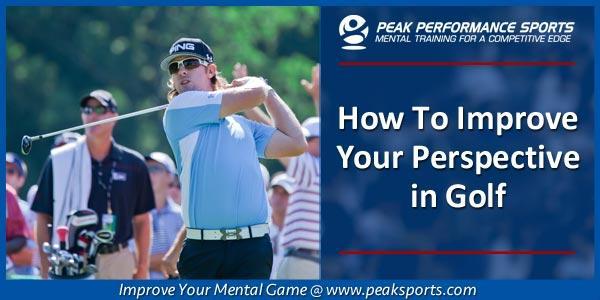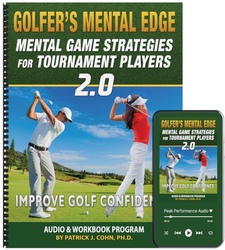
How to Keep Things in Perspective in Golf
Losing is difficult. Costly mistakes late in a round are more difficult. Keeping losses and mistakes in perspective may seem impossible at times.
The intense negative emotions you feel after a bad tee shot can disrupt your focus and cause a downward spiral over the next several shots.
While managing your emotions after a bad shot may seem difficult, it is possible and crucial for optimal play on the golf course.
The key to effectively managing your emotions after a bad shot is… PERSPECTIVE!
Perspective is how you interpret an event.
If you have a negative perspective, you will interpret bad shots as a sign that something is wrong with you, your ability or how you are playing on a particular day.
A positive perspective is not blind optimism, but it is the ability to find some usable and objective feedback from an event.
For example, “What can I learn from this?” or “How can I adjust my game to perform better in the future?”
Patrick Reed was cruising during the last round at the 2015 Honda Classic…
Reed was tied for the lead as he prepared for his tee shot on the 15th hole. Unfortunately, Reed dumped his tee shot into the water and quickly fell from contention.
When asked in his post-tournament interview to assess his performance at the Honda Classic, Reed used a positive perspective.
REED: “I felt like I hit the ball pretty solid… But any time you feel like you didn’t have your A Game and struggling a little bit and be able to finish inside the Top‑10 is always good.”
How was Reed able to keep a devastating loss in perspective? Reed focused on his past successes rather than his mistakes.
Reed has won four tournaments in 39 starts on the PGA Tour and climbed to a ranking of No. 15 in the world. In addition, Reed finished a very respectable 7th at the Honda Classic.
REED: “I had three holes that kind of bit me, but it’s my best finish here so far.”
By defining yourself by what you have accomplished, you will be able to build your confidence.
Another aspect of perspective is to learn from losses.
REED: “When you win, you always look at all the positives and everything you did well. But when you play poorly, you can fine-tune and find really what it is that you need to work on.’’
To improve your perspective, try these tips:
- Tip #1: Give yourself credit for your successes. Even if you performed poorly at a tournament, find some things you did well. That does not mean you ignore the mistakes you made. You just need to look at all of your shots during the round.
- Tip #2: Use failure as an opportunity to learn and grow. What can your mistakes teach you about future play? How can you improve your game to better your play for upcoming tournaments?
Enlist the help of a Mental Coach to help you put your play into perspective and further improve your total golf game.
Successful golfers have learned how to perform with ultimate confidence in competition. We’ve developed The Golfer’s Mental Edge Workbook Program to help you do this.
Related Sports Psychology Articles
- Helping Young Golfers Overcome Bad Shots
- How to Let Go of Bad Shots And Stay Composed
- How Do You React To Bad Shots?
*Subscribe to The Sports Psychology Podcast on iTunes
*Subscribe to The Sports Psychology Podcast on Spotify
Download a free sports psychology report to improve your mental game!
Learn more about our one-on-one mental game coaching.
Golfer’s Mental Edge

What’s the big sign that your mental game is the weak link in your golf game? When you can’t play consistently as well as when you play a practice or casual round–or your range game is way better than your game on the course. If you suffer from lack of focus, low self-confidence, poor composure or other mental game obstacles on the course, you can’t reach your true potential in golf.
The Golfer’s Mental Edge 2.0 Audio and Workbook program is ideal for any amateur, collegiate, junior, and tour professional golfer.
Golf coaches and instructors would also be wise to teach “The Golfer’s Mental Edge 2.0” principles to their players. This program is perfect for any golfer who wants to improve performance and consistency by managing their mind better on the course.
